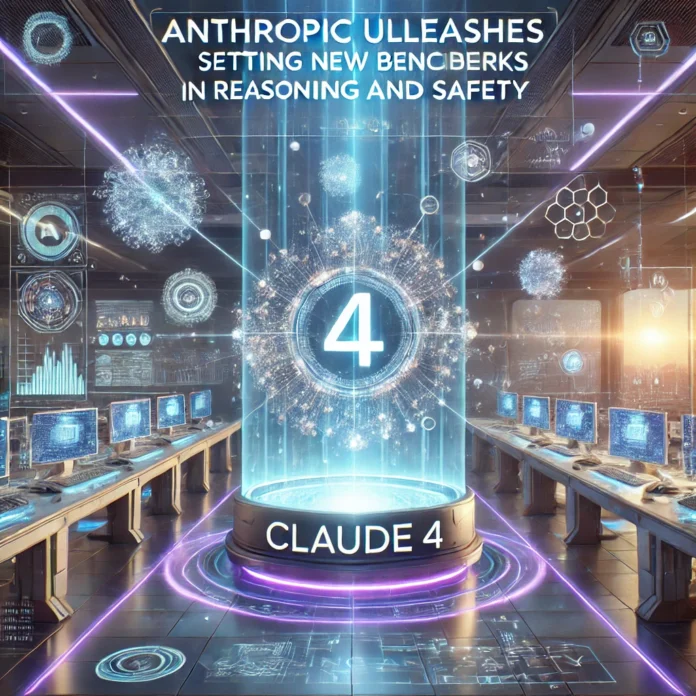The artificial intelligence landscape witnessed another significant leap forward yesterday, April 22, 2025, as Anthropic officially announced the release of its next-generation large language model, Claude 4. Positioned as a direct challenger to established leaders like OpenAI’s GPT series and Google’s Gemini, Claude 4 arrives with bold claims of superior reasoning capabilities, an expanded context window, and pioneering advancements in AI safety and alignment.
Developed by the AI safety and research company founded by former OpenAI members, Anthropic has consistently emphasized a constitutional AI approach, aiming to build models that are helpful, honest, and harmless. Claude 4 represents the culmination of this philosophy, integrating novel training techniques designed to minimize harmful outputs and enhance steerability.
Enhanced Reasoning and Performance
According to Anthropic’s technical report released alongside the announcement, Claude 4 demonstrates marked improvements across a wide range of benchmarks, particularly in complex reasoning, mathematics, and coding tasks. Early access partners have reported the model’s ability to follow intricate instructions, handle nuanced prompts, and generate highly coherent and contextually relevant long-form content more effectively than its predecessor, Claude 3.5.
One of the key highlights is the model’s significantly larger context window, reportedly capable of processing and recalling information from inputs equivalent to hundreds of thousands of tokens – roughly the length of several novels. This allows for deeper analysis of lengthy documents, more consistent character tracking in creative writing, and the ability to synthesize information from vast datasets provided within a single prompt.
«With Claude 4, we focused intensely on pushing the boundaries of complex reasoning,» stated Dr. Evelyn Reed, lead research scientist at Anthropic, in the company’s press release. «Users can expect a model that not only understands what is being asked but can also reason why and explore different facets of a problem with greater depth. This unlocks new potentials for scientific research, legal analysis, and complex strategic planning.»
Pioneering Safety Features
Anthropic is heavily promoting Claude 4’s enhanced safety features. The model incorporates an updated ‘Constitutional AI’ framework, where the AI is trained to adhere to a set of principles (the ‘constitution’) derived from sources like the UN Declaration of Human Rights and other ethical guidelines. This version includes more sophisticated techniques for detecting and refusing harmful requests, reducing bias, and explaining its reasoning when declining certain prompts.
Furthermore, Anthropic highlighted new ‘steerability’ tools for developers, allowing them finer-grained control over the model’s tone, personality, and adherence to specific guidelines, crucial for enterprise applications requiring brand alignment and strict compliance.
Market Implications and Availability
The launch of Claude 4 intensifies the competition in the rapidly evolving AI market. While OpenAI’s GPT series has enjoyed widespread adoption and Google’s Gemini boasts deep integration with its ecosystem, Anthropic aims to differentiate itself through its demonstrable commitment to safety and its focus on complex reasoning tasks often required by enterprise clients. Major cloud providers, including AWS and Google Cloud (who are also investors in Anthropic), are expected to offer access to Claude 4 via their platforms soon.
Initial access to Claude 4 is being rolled out via Anthropic’s API for enterprise clients and developers on a waitlist basis. A public-facing version, likely integrated into their chat interface (claude.ai), is expected to follow, potentially with tiered access similar to competitors.
Looking Ahead
The arrival of Claude 4 underscores the relentless pace of innovation in generative AI. Its focus on sophisticated reasoning and robust safety measures sets a new bar for competitors and signals a growing emphasis on responsible AI development. As businesses and individuals begin to integrate Claude 4 into their workflows, its real-world impact and ability to deliver on its promises will be closely monitored. This launch not only provides a powerful new tool but also fuels the ongoing debate about the capabilities, limitations, and ethical considerations surrounding increasingly advanced AI models.




